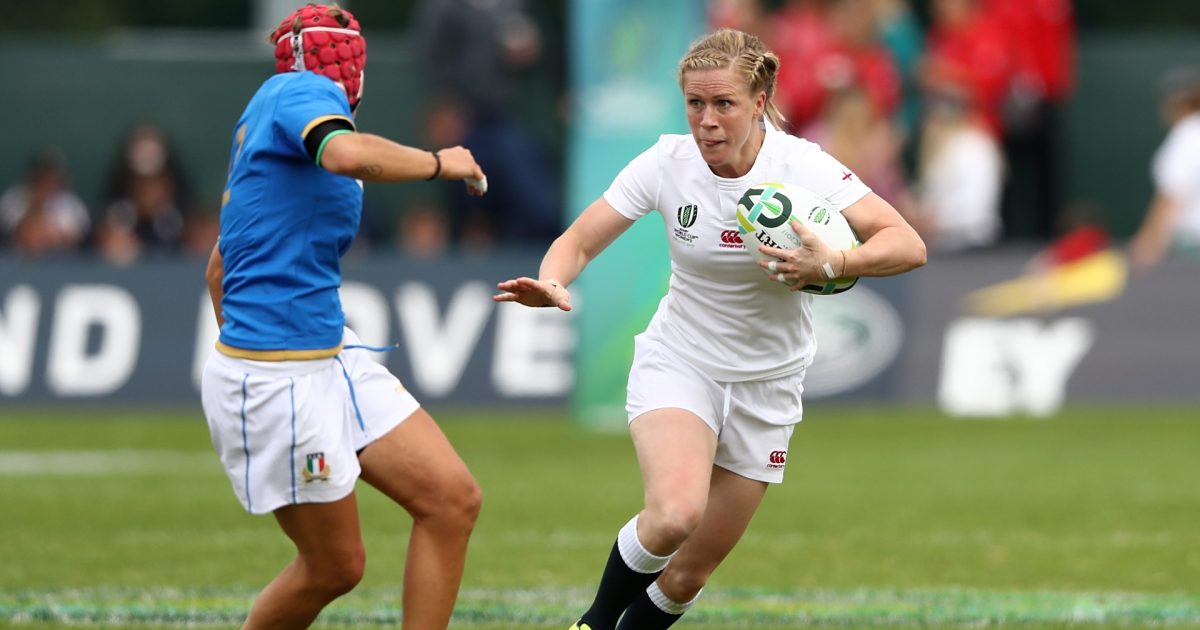‘They didn’t believe that women could pass the ball': How women’s rugby went from ‘blow-up posts’ to record crowds

Last weekend’s enthralling Six Nations clash between England and France marked another historic milestone in the continued growth of women’s rugby around the world.
Playing a standalone Test match on the treasured turf at Twickenham for the first time, the Red Roses secured a Grand Slam by beating their fierce rivals 38-33.
Following on from their devastating loss in the World Cup final last year, England hoisted the Six Nations trophy in triumph – but the significance of the occasion goes well beyond any score line.
The Black Ferns won last year’s Women’s Rugby World Cup on home soil in front of a sold-out crowd at Eden Park, and records have continued to tumble since.
After walking through a sea of England supporters ahead of last Saturday’s famous fixture, the Red Roses went on to retain their Six Nations crown in front of 58,498 fans.
WOW! 🙌🏻🌹
Come on girls! pic.twitter.com/pJjTwFmpXy
— Sarah Hunter (@sarah_hunter8) April 29, 2023
What was once believed to be possible in the women’s game continues to be both challenged and overruled, and the growth of the sport is still far from finished.
For the female athletes who have paved the way for women’s rugby, it’s been “amazing” to see how far the sport has come over the course of their careers and beyond.
Danielle ‘Nolli’ Waterman, who won a World Cup with England in 2014, said she can’t help but smile when she reflects on how far rugby has come.
“My first international tournament was a an 18-year-old, I captained England at the Europeans. It was the first time the Europeans had hosted an event like it was for the women,” Waterman told RugbyPass at this year’s Hong Kong Sevens.
“The coach came back, Gary Street, and said, ‘I’m not quite sure what they’re doing but they kept saying in some kind of broken English that they didn’t believe that women could pass the ball and they were questioning the ability of the game.’
“We were laughing.
“We got to the pitch on the 22s there were blow-up posts, they brought the pitch in five metres, so we played an international tournament on a field that was smaller than a normal field with blow-up posts.
“What was even better was no matter where you scored the try, you kicked in front of the posts which was, again, actually really disrespectful to the skill level that we had.
“It was amazing in my career to see how it changed and it just makes me smile.”
Waterman was one of several retired greats who represented HSBC as ambassadors at the Hong Kong Sevens earlier this year.
Alongside Waterman, the likes of Australian sevens legend Alicia Quirk and American rugby great Abby Gustaitis spoke about another significant milestone for women’s rugby.
For the first time ever, the Women’s World Series made a stop at the traditional home of rugby sevens – and competed alongside the men over three days at Hong Kong Stadium.
Olympic gold medalist Alicia Quirk opened up her journey to rugby sevens, and explained why she’s not surprised to see “major” change in the growth and development of women’s rugby on a regular basis.
“When I first started, I came from touch football where I paid $3,500 to play for Australia at a World Cup,” Quirk said, speaking as an ambassador of HSBC.
“You’re fundraising selling your choccys around local schools and things to get to where you are.
“When all of his touchies influx into rugby, they were offering to pay for us to come to a camp and to teach us this game and fly us around the world and we thought that was the bees knees from where we’d come from.
“I’ve been fortunate enough to see the fruits of all the works of the Nolli’s and the ladies before us that did all those hard yards with the blow-up fields.
“I got a taste of the semi-professional life, and we were one of the first teams besides the Netherlands at the time to go professional in 2014 in a bid to be successful for the Rio Olympics.
“It doesn’t surprise me that we are here because every year or every second year, there’s something major that rugby is doing for the women’s game to grow it and evolve it.
“There’s been so many firsts in my short career as well that’s now becoming the normal which I think is really incredible to see.
“There has been that progress that’s been there. It shows the capacity and opportunity is actually limitless. Even though there is so much more to do, it will get there.”
Echoing those comments, American Abby Gustaitis said she “always knew” that women’s rugby would get to this level in Hong Kong.
Growing up, Gustaitis played baseball and soccer alongside boys in a small town – believing that “whatever they could do, I could do.”
“It came so far in my career but there’s no ceiling for it and I think that’s attributed to so many incredible players that have come before,” Gustaitis said.
“Watching the Women’s World Cup in New Zealand last year and seeing 40,000+ people, a sell-out crowd, like what an incredible atmosphere.
“It wouldn’t be there if there wasn’t a product on the field, but because the game is so exciting, it’s the level of skill, the fitness, the speed, it’s all there and the audience is just gets right behind it.”


































